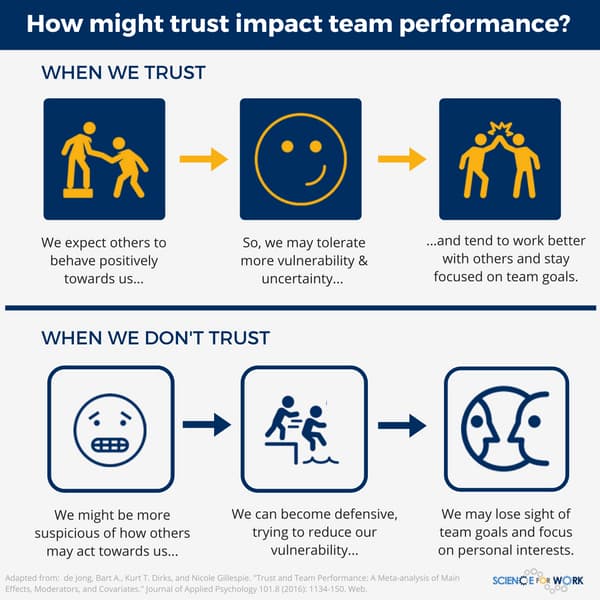3 Ways to Build Trust in A Team
 In some sports we trust our lives to our teammates–Photo by Jeff Ochoa on Unsplash
In some sports we trust our lives to our teammates–Photo by Jeff Ochoa on Unsplash
Product teams are highly collaborative and interdependent–we greatly depend on our teammates to reach our goals. This dependence can be a gift or a curse, and trust defines which one we get. Trust is proven to be one of the main components of an effective team. There are many ways it impacts how well we work together:
- We focus on collective goals more than personal ones;
- We show and tolerate more vulnerability and uncertainty;
- We learn more from one another;
 Taken from ScienceForWork's article: Trust: does it impact team performance… or not?
Taken from ScienceForWork's article: Trust: does it impact team performance… or not?
Before we go into the practices to build this critical characteristic in our teams, let's first agree on a definition. I love this one by Patrick Lencioni:
"The kind of trust that is necessary to build a great team is what I call vulnerability-based trust. This is what happens when members get to a point where they are completely comfortable being transparent, honest, and naked with one another, where they say and genuinely mean things like "I screwed up," "I need help," "Your idea is better than mine," "I wish I could learn to do that as well as you do," and even, "I'm sorry." When everyone on a team knows that everyone else is vulnerable enough to say and mean those things, and that no one is going to hide his or her weaknesses or mistakes, they develop a deep and uncommon sense of trust. They speak more freely and fearlessly with one another and don't waste time and energy putting on airs or pretending to be someone they're not. Over time, this creates a bond that exceeds what many people ever experience in their lives."
Trust is deeply connected with vulnerability, and this is key to understanding these three ways we can build it in our teams.
Leadership Must Show Vulnerability
When creating a trusting team, the most important thing is that everyone in the team perceives the Leaders as people who fail and are ok with being vulnerable. We can't expect the team to take risks if we're not taking them. We need to be willing to risk losing our "prestige" if we want people to take that risk.
Be careful with how you show vulnerability. You need to be authentic. People can smell a fake show of vulnerability a mile away, and it will erode trust instead of creating it.
Create a Safe and Inclusive Space
Most, if not all, people will not show vulnerability if they don't feel safe. If they think others will judge them or that taking a risk will harm their self-identity, they will avoid it. Some tactical tips for doing this:
- Frame the work as a learning problem, not an execution problem. Celebrate execution failures that were learning opportunities. Praise people who took risks.
- Invite everyone to share their ideas and refrain from cutting them off too soon. Help people clarify and develop their ideas before deciding on moving forward with them or not. If you see people dismissing others' ideas, be quick to intervene and give them feedback later. Help people develop nonviolent communication.
- When people show vulnerability, make sure they're not punished for it. Even better if we celebrate and give them positive feedback for it. Even the best-intentioned teams can subtly break trust by somehow punishing people when they admit weakness or failure.
- Model curiosity. Ask a lot of open-ended questions, and don't assume you know the answers.
Take time to let the team know each other outside of work.
Knowing others' stories, preferences, and even trivia about their lives is key to fostering trust–rapport goes a long way. This is especially true in Brazillian culture. So it's essential to dedicate time to this and not perceive it as "not work-related." Here are some things I've found that goes a long way:
- Incentivize peers and people in the team to have scheduled and frequent one on ones
- Start longer meetings with Ice Breakers that have questions that give us insight into people's lives or how they think.
- Have dedicated time for people to hang out and talk about things that aren't work-related. This became especially important when remote work started being the norm. We don't bump into each other in the hallway or go out to lunch together anymore.
Rapport and having people care about each other is incredible for building trust.
In conclusion
Trust is a condition for Psychological Safety, and Psychological safety is a condition for effective teams. When we're in a trusting team, work becomes more fulfilling, and we shift our work dynamics to push people to grow faster and be more effective. Building trust is not easy and takes time, but if we have these three things, we're already way ahead:
- Leadership showing vulnerability
- A Safe and Inclusive Space
- People taking time to know each other outside of work
Build these into your team, and see the impact that trust has on your results, people, and yourself. I bet you won't regret it.